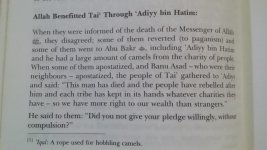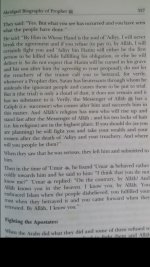Hatim al-Tai or Hatim Altaaey (Arabic: حاتم الطائي Hatim of the Tayy tribe; died 578), but formally Ḥātim bin ʿAbda'llāh bin Saʿad a'ṭ-Ṭāʾiyy (Arabic: حاتم بن عبد الله بن سعد الطائي) was a famous Arab poet who belonged to the Ta'i tribe of Arabia. Stories about his extreme generosity have made him an icon among Arabs up until today, as evident in the proverbial phrase "more generous than Hatim" (Arabic: أكرم من حاتم).
https://en.m.wikipedia.org/wiki/Hatim_al-Tai
Adiyy ibn Hatim ( عدي ابن حاتم الطائي ) was a leader of the Arab tribe of Tayy, and one of the companions of Muhammad. He is the son of the poet Hatim al-Tai[1] who was widely known for his chivalry and generosity among Arabs. Adi remained antagonistic to Islam for about twenty years until he converted to Islam from Christianity[2] in 630 (9th year of Hijra).[3]
Adiyy inherited the domain of his father and was confirmed in the position by the Tayy people. A great part of his strength lay in the fact that a quarter of any amount they gained as booty from raiding expeditions had to be given to him.
Adi joined the Islamic army at the time of caliph Abu Bakr. He fought wars of revolt against the apostates and also was a commander of the Islamic army sent to invade Iraq under the command of Khalid ibn al-Walid. He also fought on the side of Ali ibn Abi Talib, at the Battle of Camel and Battle of Siffin.
https://en.m.wikipedia.org/wiki/Adi_ibn_Hatim
There are a number of ahaadeeth which mention Haatim al-Taai, some of which are hasan (good), some da’eef (weak) and some mawdoo’ (fabricated).
(a) It was narrated that ‘Adiyy ibn Haatim said: I said to the Messenger of Allaah (peace and blessings of Allaah be upon him), “My father used to uphold the ties of kinship, and do such and such… Will he have any (reward) for that?” He said, “Your father seeking something and he got it.”
This was narrated by Ahmad, 32/129, and classed and hasan by Shaykh Shu’ayb al-Arna’oot.
(b) It was narrated that ‘Adiyy ibn Haatim said: I said, “O Messenger of Allaah, my father used to uphold the ties of kinship, and do such and such.” He said, “Your father wanted something and got it” meaning, fame.
Narrated by Ahmad (30/200); classed as hasan by Shaykh Shu’ayb al-Arna’oot, and classed as saheeh by Ibn Hibbaan, 1/41.
(c) It was narrated from Sahl ibn Sa’d al-Saa’idi that ‘Adiyy ibn Haatim came to the Messenger of Allaah (peace and blessings of Allaah be upon him) and said: “O Messenger of Allaah, my father used to uphold the ties of kinship, and spend on the needy, and feed people.” He said, “Did he live to see Islam?” He said, “No.” He said, “Your father wanted to be remembered.”
Narrated by al-Tabaraani in al-Kabeer, 6/197. Its isnaad includes Rushdeen ibn Sa’d, who is da’eef (weak), but it is supported by the report mentioned above.
The phrase translated above and “spend on the needy” means spending on the weak, the poor, orphans and dependents, etc.
(d) It was narrated that Ibn ‘Umar said: Mention was made of Haatim in the presence of the Prophet (peace and blessings of Allaah be upon him), and he said, “That is a man who wanted something and got it.”
Al-Haythami said:
This was narrated by al-Bazzaar, and its isnaad includes ‘Ubayd ibn Waaqid al-‘Absi, who was classed as da’eef by Abu Haatim.
Majma’ al-Zawaa’id, 1/119
But it is supported by the reports quoted above.
Ibn Katheer said:
We have mentioned the biography of Haatim Tay’ in the days of the Jaahiliyyah when we mentioned those who died of the famous people of that era, and we referred to his generosity and kindness to people. But generosity and kindness must be based on faith if they are to benefit a person in the Hereafter, but he never said one day, “O Lord, forgive me my sins on the Day of Judgement.”
Al-Bidaayah wa’l-Nihaayah, 5/67.
And Allaah knows best.
https://islamqa.info/en/11909
Muslim (203) narrated from Anas (may Allaah be pleased with him)
That a man said:
“O Messenger of Allaah, where is my father?”
He said: “In Hell.”
When he turned away he called him back and said:
“My father and your father are in Hell.”
Al-Nawawi (may Allaah have mercy on him) said:
This shows that whoever dies in a state of kufr will be in Hell. And being related to one who is close to Allaah will not avail him anything. It also shows that whoever died during the fatrah (the interval between the Prophethood of ‘Eesa (peace be upon him) and that of Muhammad (peace and blessings of Allaah be upon him)) and was the follower of the way of the Arabs at that time, which was idol worship, will also be among the people of Hell. There is no excuse for the call not reaching them, because the call of Ibraaheem and other Prophets (peace be upon them) had reached these people.
Muslim (976) narrated that Abu Hurayrah (may Allaah be pleased with him) said:
The Messenger of Allaah (peace and blessings of Allaah be upon him) said:
“I asked my Lord for permission to pray for forgiveness for my mother, but He did not give me permission. And I asked Him for permission to visit her grave, and He gave me permission.”
https://islamqa.info/en/47170
Arabic
أَجَعَلْتُمْ سِقَايَةَ الْحَاجِّ وَعِمَارَةَ الْمَسْجِدِ الْحَرَامِ كَمَنْ آمَنَ بِاللَّهِ وَالْيَوْمِ الْآخِرِ وَجَاهَدَ فِي سَبِيلِ اللَّهِ لَا يَسْتَوُونَ عِندَ اللَّهِ وَاللَّهُ لَا يَهْدِي الْقَوْمَ الظَّالِمِينَ
Transliteration
AjaAAaltum siqayata alhajji waAAimarata almasjidi alharami kaman amana biAllahi waalyawmi al-akhiri wajahada fee sabeeli Allahi la yastawoona AAinda Allahi waAllahu la yahdee alqawma alththalimeena
Literal
(Word by Word)
Do you make the providing of water (to) the pilgrims and (the) maintenance (of) Al-Masjid Al-Haraam like (the one) who believes in Allah and the Day the Last, and strives in (the) way (of) Allah? They are not equal near Allah. And Allah (does) not guide the people unjust.
Muhammad Asad
Do you, perchance, regard the [mere] giving of water to pilgrims and the tending of the Inviolable House of Worship as being equal to [the works of] one who believes in God and the Last Day and strives hard in God's cause? These [things] are not equal in the sight of God. And God does not grace with His guidance people who [deliberately] do wrong.
M. M. Pickthall
Count ye the slaking of a pilgrim's thirst and tendance of the Inviolable Place of Worship as (equal to the worth of) him who believeth in Allah and the Last Day, and striveth in the way of Allah? They are not equal in the sight of Allah. Allah guideth not wrongdoing folk.
Yusuf Ali (Saudi Rev. 1985)
Do ye make the giving of drink to pilgrims, or the maintenance of the Sacred Mosque, equal to (the pious service of) those who believe in Allah and the Last Day, and strive with might and main in the cause of Allah? They are not comparable in the sight of Allah: and Allah guides not those who do wrong.
Quran 9:19
Click to enlarge:


Arabic
يَا أَيُّهَا الَّذِينَ آمَنُوا اتَّقُوا اللَّهَ وَابْتَغُوا إِلَيْهِ الْوَسِيلَةَ وَجَاهِدُوا فِي سَبِيلِهِ لَعَلَّكُمْ تُفْلِحُونَ
“O you who have believed, fear Allah and seek the means [of nearness] to Him and strive in His cause that you may succeed.”
– Quran 5:35



